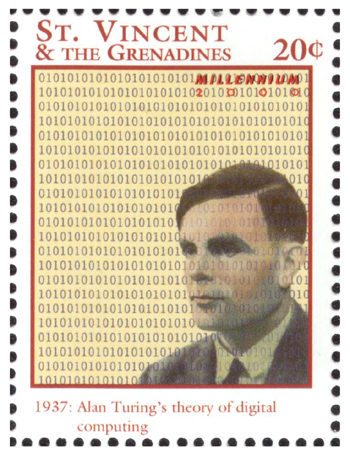Alan Turing
Alan Turing was undoubtedly one of the most influential minds of the twentieth century, and one whose tragic life story is only now beginning to be appreciated.
His father was in the Royal Foreign Service and was often absent in India and elsewhere, so Turing developed an exceptionally close relationship with his Mother. His schooling included the Hazelhurst Preparatory Academy where he was rated as an "average to good" pupil. Later he entered the Sherbourne School where he met and fell in love with an older student, Christopher Morcom. Together they studied mathematics and chemistry, reading Eddington's book on quantum mechanics and Einstein's papers on relativity. Morcom's premature death from tuberculosis in 1930 had a profound impact on Turing, inspiring him to achieve what his friend could not.
In 1931 Turing entered King's College at Cambridge and was elected a Fellow of the College in 1935, defending his dissertation On the Gaussian Error Function which proved fundamental results in probability, including the modern version of the Central Limit Theorm -- although it had been earlier proved by Lyapunov, Turing was unaware of this and his discovery was independent.
While at King's College Turing studied the major outstanding mathematical questions of the day, including Hilbert's decidability question. In 1936 he published his masterwork, On Computable Numbers, with an application to the Entscheidungsproblem. He ingeniously solved the the decidibility problem through the "Turing Machine" which provides the theoretical basis for all computing machines today. Because of this work, Turing is regarded as the founder of comptuer science.
In 1939 Turing became a full time employee of the Government Code and Cypher School at Bletchley Park. For many years the Official Secrets Act prevented disclosure of how important his contributions were to the war effort, although it is now clear that his brilliant work at decyphering German codes saved more lives than any other individual in World War II. Winston Churchill described Turing as the "man who won the Battle of Britain."
Turing lived openly as a gay man. During the Cold War and due to the alliance with the United States, Turing was no longer able to obtain a security clearance and was excluded from any work on cyphers, even while his enormous contributions went unrecognized. Undaunted he continued his studies in decidability, group theory, quantum mechanics, neurology and physiology. In 1950 he published the remarkable Computing machinery and intelligence in which he foresaw many problems in modern computer science. In this book he hypothesized that computing machines would someday become intelligent and proposed the "Turing Test" for determining true machine intelligence. This test is still accepted today, although no machine has yet passed it.
In 1952 a young man with whom Turing had been having an affair threatened to blackmail him. Turing reported the matter to the police, including in a matter of fact way that the two had had sexual relations. In an era when Nazi war criminals were being freed, Turing was convicted for violating the British homosexuality statutes and given the choice between prison and chemical castration. Turing chose the latter.
In 1954 Turing died from cyanide poisoning in what was officially ruled a suicide, although his Mother maintained it was an accident resulting from a failed chemistry experiment. Other biographers, who have noted that Turing was a marathon runner of nearly Olympic quality and not one to give up, have suggested that assassination should not be ruled out. After his conviction, Turing continued to maintain that he had done nothing wrong and to live an open life as a gay man, taking heart from the nascent Swedish gay liberation movement. This became an embarassment to British intelligence circles and Turing's death certainly conveniently spared the relationship with US intelligence. However, Turing was much depressed by the effects of the chemical castration and had talked of suicide; it is generally accepted today that he took his own life.
Throughout his life, Turing was a brilliant scientist, a philosopher absolutely committed to individual liberty and a deep thinker. His work on computing will certainly continue to have profound impact on succeeding generations.
Today the main loop road around Manchester is named Alan Turing Way in his honor. St. Vincent and the Grenadines honored him with a stamp in 2000. His life story was chronicled in the film Breaking the Code in 1996. His biographer Andrew Hodges maintains the Alan Turing homepage.

Died: 7 June 1954 in Wilmslow, Cheshire, England
The premiere site for biographies of mathematicians on the web is at The University of Saint Andrews in Scotland; this is the primary source of the information in these short biographies. Some biographies used additional web resources as noted in the biography.
The postage stamp images came from a wonderful site on mathematicians on stamps maintained by Jeff Miller, a mathematics teacher in Florida.
The Free Internet Encyclopedia Wikipedia is also an excellent source of information and was used as a reference for many bographies.
The opinions expressed in these biographies are those of the author and do not reflect official views of the University of Oklahoma.
